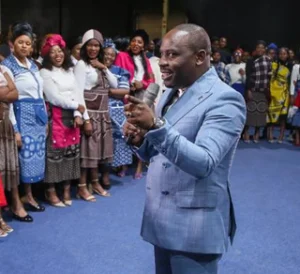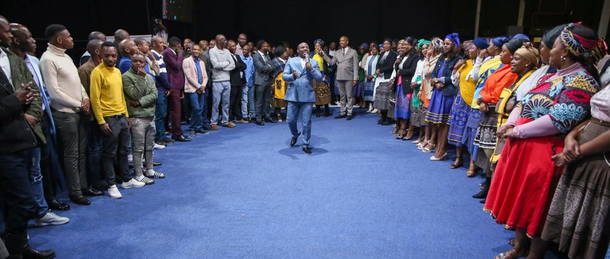More than 6,000-worshippers from all over South Africa and nearby countries have gathered at Apostle Joshua Mohlala’s Shekinah Healing Ministries church premises in Cape Town, not for a spiritual service but to find partners. The best-known matchmaking church in South Africa held its third annual conference July 6, and thousands of single worshippers gathered to find love and marriage.
“It’s simple,” Bandile Xaba, one of the church’s supervisors explained to Baptists News Global. “Christian single women line up inside the church hall on one end, and men of similar status do too. Publicly, women get to fingerpoint and pick men whom they wish to date and hopefully marry. If the man agrees to the public courtship, the apostle prays for them, counsels them and releases them to their prospective families for further marriage guidance and ceremonies. We have married off 150 couples this way in the last three years — and not a single case of divorce or marital violence has been reported to our church.”
The Shekinah Healing Ministries matchmaking event is so popular that thousands of hopefuls travel overnight from neighboring countries to be part of the event. And 50% of the church’s members have found their life partners via these public events.
The rates of reported divorce have been very low, Xaba added.

Musawenkosi Joshua Mohlala
Shekinah Healing Ministries has been established in South Africa for 20 years and in its public matchmaking events, hopeful couples must wear traditional African attire to make more authentic matches.
In days of traditional African norms gone by, dating and marriage were not individualistic acts as per Western norms. They were publicly arranged between families of the would-be bride and groom, explained Sipho Lobatse, a pastor with the African Reformed Zion Church in Pretoria, South Africa’s capital. The African Reformed Zion Church also conducts its versions of matchmaking ceremonies but once every two years.
“Matchmaking churches in South Africa are gaining popularity because they revive a dating style that is seen as traditionally African,” Lobatse said.
“We are simply saying, the Western Anglican or Methodist weddings where expensive rings are exchanged; white veils are worn by brides and the groom hiring a horse-drawn chariot is not the only type of wedding out there.”
The result is that matchmaking Africanist churches have some of the fastest growing church branches in South Africa. However, critics say these matchmaking churches are making things worse for women because they prey on women desperate for marriage and commitment.
Matchmaking Africanist churches have some of the fastest growing church branches in South Africa.
Marriages in South Africa record some of the world’s highest incidents of gender-based violence (wives being assaulted, raped or shot by their husbands). In the five-year period between 2015 and 2020, a total of 13,815 women over the age of 18 years were murdered, according to the South African Police Service.
Matchmaking Africanist churches claim Western weddings and marriage norms are some of the reasons intimate partner violence in marriages is high, according to critic Pamela Wande of the Women Choices Forum, a community gender alliance in Johannesburg. “Why must women be paraded in public and pressurized to pick a partner? Who knows if a misogynistic man or a potential rapist is hiding behind the church ceremony, pretending to be morally upright to pounce on desperate church women?”
“You will see that the majority of the wildly popular matchmaking churches are headed by male pastors — and that means tightly controlling how the ceremonies unfold,” added Wande, the women rights activist.
But Xaba, the church supervisor, dismisses such criticism outright. A better alternative, which his church is doing, is to incorporate traditional African matchmaking customs and hold public courtship (matchmaking) ceremonies like the one Apostle Joshua Mohlala does annually for thousands.
“For us an Africanist church, public matchmaking is our way of rejecting Western-style weddings (rings, independent dating) which we believe are one of the causes of high marital violence in South Africa,” Xaba said. “We empower women because during public matchmaking ceremonies, it is the women who fingerpoint and choose a potential male partner, and as soon as there are allegations of the groom abuse his wife, we demand the wife report back to us the church and we will publicly shame the man in front of church, reprimand him or report him to police straight away.”

